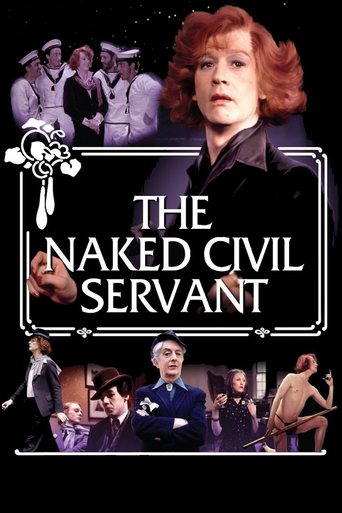a_baron
John Hurt is one of England's finest actors, and in his long career there are two performances that stand out: "The Elephant Man" which earned him an Oscar nomination, and "The Naked Civil Servant", which as a TV dramatisation could not. Hurt plays the enigmatic Quentin Crisp to a tee. Unlike the vast majority of today's Western homosexuals, Crisp knew what he was and made no attempt either to fit in or to embrace the so-called gay culture. He realised the futility of the effeminate homosexual's search for what he called his great dark man, and in the end abandoned it. He died at the age of 90 after being celibate for half a century.He was also a natural exhibitionist, so his accidental choice of career was fitting. It remains to be seen how much licence has been taken either by Crisp himself – whose autobiography is called "The Naked Civil Servant" - or by the film makers, but certainly being an out homosexual in London from the 1920s to the 1950s was a different proposition from today, and there is no doubt he would have been queer-bashed from time to time.Something else that has changed is the public perception of the police, a perception that on occasion finds its way to the bench. That being said, the court scene was the high point of this dramatisation.
welshNick
This is not me gaybashing. This film is pure filth. It tells the story of Quentin Crisp, one of the most outrageous homosexuals that has ever lived. He wore make up, nail polish, dyed his hair and was totally effeminate in every way. At a time when gays are trying to gain acceptance a character like this did no service back then and certainly does no service now to gays wanting to be seen as normal. The nauseating accent which John Huer put on for this film really set the tone for what followed. It was a portrayal of a real social misfit who made no attempt whatsoever to live properly in decent society. He may be a hero to some people in the gay community but to me he was little more than a show off extrovert who dressed and acted the way he did purely to try and make a statement. Tasteless.
Gordon-11
This film is the autobiography of Quentin Crisp, a gay man living in the conservative times of 1920's to 1970's.The story is simple but deep. It portrays It also portrays how people lived in fear and loneliness during those days. A particularly remarkable moment is that, after Quentin's friend is released from he mental institution, his friend pronounced his love for him. Quentin says something to the effect of "This is how lonely he is, and how low I can get". This little sentence means so much. Acting by John Hurt is excellent. This film is really quite remarkable, as homosexuality was still considered as a mental illness back in 1975.
mermatt
I had the good fortune to meet the late Quentin Crisp several times. This film is a delightful and moving story of his evolution as a human being.Like Oscar Wilde, he was the brunt of jokes and nasty stories because he dared to be himself -- and, to use his own word, a very "autre" self indeed. John Hurt does a wonderful job showing us the spirit of a man who didn't grovel to the conventions of society and dared to give the world a free spirit.The ironic conclusion of the film is an observation by Crisp himself that the "autre" which was once his alone became the commonplace of the late 1960s and early 1970s.This is an unusual film worth seeing for the performances as well as for its lessons in living. We are who we let ourselves be. We can be who we desire to be, or we can surrender to the drab molds of the society around us.


 AD
AD


